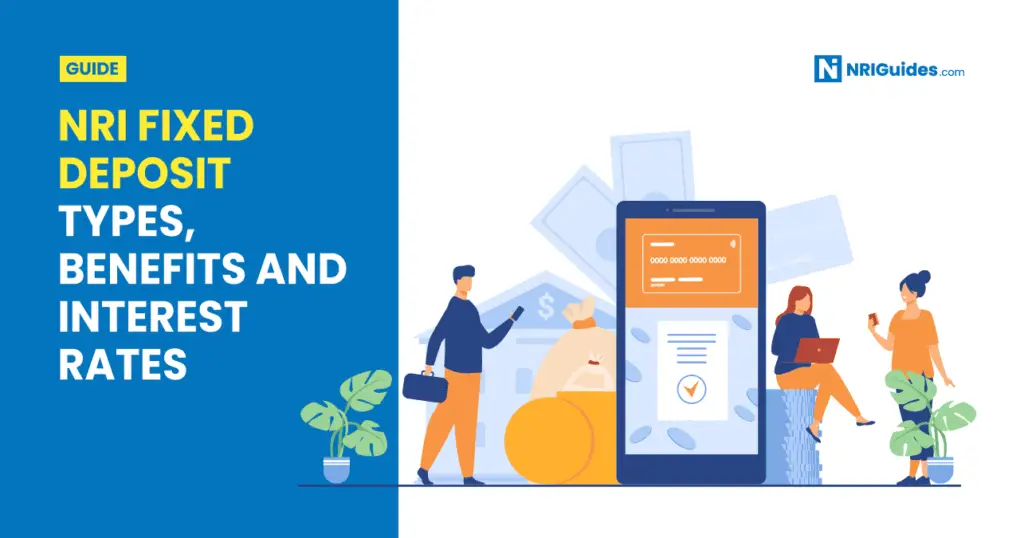The NRI Guides Team regularly reviews this article to ensure the content is up-to-date and accurate. The last editorial review and update were on 25 October 2023.
Fixed deposit bank accounts have been a favourite choice for traditional money savers for a really long time, mainly due to their low-risk nature and higher interest rates than regular savings accounts.
With millions of people living and earning outside India, fixed deposits for Non-Resident Indians (NRIs) are becoming increasingly popular. In this article, we will discuss the features, benefits, and drawbacks of an NRI fixed deposit.
Table of Contents
What is an NRI Fixed Deposit Account?
An NRI fixed deposit is a term deposit opened by a Non-Resident Indian (or a PIO/OCI) in one of the Indian banks.
Unlike a savings account, in a fixed deposit account, your money is locked for a fixed period of time. You cannot freely withdraw from a fixed deposit and premature withdrawal may attract a penalty or loss of interest.
The good part is that fixed deposits offer better interest rates than saving accounts and are a low-risk and rewarding way to save your money for future goals.
Eligibility for NRI Fixed Deposit Account
You are eligible to open an NRI fixed deposit account if you are a non-resident individual of Indian nationality, or of Indian origin.
These include Indian citizens, Persons of Indian Origin (PIO) or Overseas Citizens of India (OCI) legally employed, doing business, studying or living abroad.
Individuals posted in UN organisations or officials deputed abroad by the Government of India or public sector undertakings and Indian nationals who are mariners or working on oil rigs or foreign registered airlines are also eligible.
NRI fixed deposit can be opened either individually or as a joint account with other NRIs or Resident Indians.
NRI Fixed Deposit Benefits
Higher interest: NRI fixed deposits are higher interest-yielding financial products than regular savings accounts, and they usually pay you fixed interest rates on your deposits on or until a specified maturity date.
Tax-free interest: Interest earned on certain NRI fixed deposits is tax-free in India. For example, a fixed deposit account opened through an NRE account in India is not taxable in India.
Easy repatriation: For most NRI deposits (except NRO fixed deposits), the principal amount and interest earned are fully repatriable.
Premature withdrawal: Banks offer premature withdrawal of NRI fixed deposits with prior notification. However, your deposit will qualify for interest only if it is carried on for a stipulated period of time designated by your bank.
Attractive loan options: Most banks also offer loans on NRI FD accounts for up to 90% of your deposit at attractive interest rates.
Auto-renewal: NRI fixed deposits can be auto-renewed on maturity as per instructions given by you.

Types of NRI Fixed Deposit Account
Many banks in India offer customized fixed deposit schemes for NRI customers who wish to deposit Indian Rupees and foreign currency in Indian banks. An NRI can open such accounts with any bank authorized to deal in foreign exchange in India.
Below are the common types of NRI fixed deposits usually offered by Indian banks:
1. Non-Resident External (NRE) FD Account
- NRE fixed deposits are a high-return Rupee deposit option to invest your foreign income. They earn high tax-free interest, and the deposit and the interest are entirely repatriable.
- NRE fixed deposits are maintained in Indian Rupee (INR).
- For most banks, NRE fixed deposits can be booked for a tenure ranging from one year to 10 years.
2. Non-Resident Ordinary (NRO) FD Account
- NRO Fixed Deposits are a high-return Rupee deposit option to invest your foreign and domestic income
- Unlike NRE FD accounts, interest earned on NRO FD accounts is subject to the applicable tax deducted at source (TDS).
- Interest earned in the current financial year is fully repatriable (after deducting tax). Funds in the NRO account can be repatriated up to USD one million per financial year for all bonafide purposes.
- For most banks, NRO fixed deposits can be booked for a tenure ranging from seven days to 10 years.
3. FCNR(B) Fixed Deposit Account
- A Foreign Currency Non-Resident (Bank) deposit is a fixed deposit held in foreign currency.
- As they are denominated in foreign currency, exchange rate fluctuations have no impact.
- Interest earned on FCNR deposits is tax-free.
- The deposit and the interest on FCNR (B) accounts are fully repatriable.
Comparison of NRI Account Types
| Particulars | NRE | NRO | FCNR |
|---|---|---|---|
| Denomination | Indian Rupee | Indian Rupee | Foreign currency |
| Type of Account | Current Account/ Savings Account/ Recurring Deposit/ Fixed Deposit | Current Account/ Savings Account/ Recurring Deposit/ Fixed Deposit | Recurring Deposit/ Fixed Deposit |
| Repatriability | Fully repatriable | No restrictions on interest earned, principal is repatriable up to specified limits | Fully repatriable |
| Tax | Exempt | Interest might be subjected to tax | Exempt |
How to Open an NRI Fixed Deposit Account?
You can open an NRE, NRO or FCNR(B) fixed deposit account through internet banking, mobile banking, or by visiting the nearest branch of your bank. The documentation process will be straightforward if you already have an NRE or NRO account.
Documents Required to Open an NRI Fixed Deposit Account
The following documents are needed for opening an NRI fixed deposit:
- Self-attested passport copy
- Valid work permit, employment visa, residence visa or residence permit
- Address proof
- OCI card may be required for OCIs
Funding for NRI Fixed Deposits
Funding for NRI fixed deposit should be from the customer’s KYC-compliant account through cheque, DD, or inward remittance (wire transfer).
Please note that you cannot transfer funds from your NRO accounts to open an NRE fixed deposit or FCNR fixed deposit.
NRE Fixed Deposit Rates
| Bank | Tenure | Rate of return (p.a.) |
|---|---|---|
| HDFC Bank | 7 days to 10 years | 2.75% – 4.80% |
| SBI Bank | 1 year to 10 years | 5.10% – 5.50% |
| Axis Bank | 1 year to 10 years | 5.10% – 5.75% |
| Federal Bank | 1 year to above 5 years | 5.15% – 5.60% |
Disadvantages of NRI Fixed Deposits
Even though NRI fixed deposits are a safe and secure way to save your money, they come with some limitations too.
Low returns: Even though NRI fixed deposits offer safe and guaranteed interest rates, the returns may be lower than market-linked investments like mutual funds or equity shares. Considering the rate of inflation, the value added over the years may not be much.
Liquidity: Fixed deposits are not liquid and cannot be converted into cash easily. As fixed deposit funds are locked for a fixed duration, they are not available for you to use unless you withdraw the funds prematurely.
Penalties on premature withdrawal: For most banks, no interest is payable if the NRI fixed deposit is prematurely closed within one year. If the closure is after one year, most banks will pay interest up to the previous period. Please check with your bank for more details.
Tax liability: Interest earned through NRO fixed deposit will be taxable in India and treated as regular income.
In short, an NRI fixed deposit is a financial instrument for NRIs who do not want to take much financial risk. If you are a person who likes to see fixed income in your account, then an NRI fixed deposit may be right for you.
Reference: Reserve Bank of India
Frequently Asked Questions
How can I withdraw from my NRI fixed deposit account?
You can withdraw from your NRI fixed deposit to your NRE or NRO account through internet banking, mobile banking or by visiting your branch.
Can I have a nominee for my NRI fixed deposit?
Yes. A nomination facility is available for NRI fixed deposits.
You May Also Like:
- Type of NRI Bank Account Types and Their Differences
- NRI Home Loan Eligibility and Interest Rates
- NRI Joint Account With Resident: Complete Guide
- NRI Buying Property in India: All Your Questions Answered
Copyright © NRIGuides.com – Unauthorized reproduction of this article in any language is prohibited. The information provided on this website is intended for general guidance and informational purposes only. It should not be considered a substitute for professional advice.

Aneesh, the Founder & Editor of DG Pixels, holds a Master’s Degree in Communication & Journalism, and has two decades of experience living in the Middle East. Since 2014, he and his team have been sharing helpful content on travel, visa rules, and expatriate affairs.
